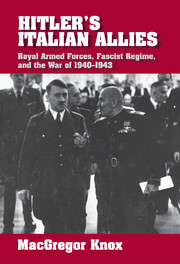Book contents
- Frontmatter
- Contents
- Acknowledgements
- List of Abbreviations
- Map
- Introduction: Defeat – and Humiliation
- 1 Fascist Italy's Last War
- 2 Society, Politics, Regime, Industry
- 3 Men and Machines: The Armed Forces and Modern Warfare
- 4 Strategy
- 5 Operations
- 6 Tactics
- Conclusion: The Weight of the Past
- Chronology
- Bibliographical Note
- Index
Conclusion: The Weight of the Past
Published online by Cambridge University Press: 19 January 2010
- Frontmatter
- Contents
- Acknowledgements
- List of Abbreviations
- Map
- Introduction: Defeat – and Humiliation
- 1 Fascist Italy's Last War
- 2 Society, Politics, Regime, Industry
- 3 Men and Machines: The Armed Forces and Modern Warfare
- 4 Strategy
- 5 Operations
- 6 Tactics
- Conclusion: The Weight of the Past
- Chronology
- Bibliographical Note
- Index
Summary
Most attempts to explain Fascist Italy's disastrous performance in the great war that it sought for twenty years have rested on two assertions and one comparison. The first assertion is that Mussolini and the Fascist regime engineered Italy's humiliation by deliberately creating a mere “facade” of military power. Intervention in June 1940 was in this reading nothing more than a gamble that German victories would dispense Italy from having to fight, and subsequent dissipation of effort allegedly resulted above all from the regime's domestic propaganda requirements. The second assertion is that for the vast majority of Italians the war of 1940–43 was “a war not felt” and therefore lethargically fought. The comparison is inevitably to the Great War, in which the armed forces and government allegedly performed with far greater competence, determination, and rationality, amid far greater elite and popular support for the war and its objectives.
It should nevertheless be abundantly clear by this point that the humiliating inadequacy of Italian military performance in 1940–43 had sources far more complex than the alleged primacy of the regime's propaganda, and that those sources were reciprocally interrelated at a variety of levels. Parochialism, fragile military traditions, shortages of key technical skills; energy and raw material dependence; the regime's inability to mobilize effectively what resources existed; the incompetence and venality of industry; the deficiencies in military culture that prevented the armed forces from imagining, much less preparing for modern war; strategic myopia, dissipation of effort, passivity, logistical ineffectiveness, and dependence; and the armed forces' greater or lesser degrees of operational and tactical incapacity were so interwoven that separating them analytically is a thankless task.
- Type
- Chapter
- Information
- Hitler's Italian AlliesRoyal Armed Forces, Fascist Regime, and the War of 1940–1943, pp. 169 - 178Publisher: Cambridge University PressPrint publication year: 2000

